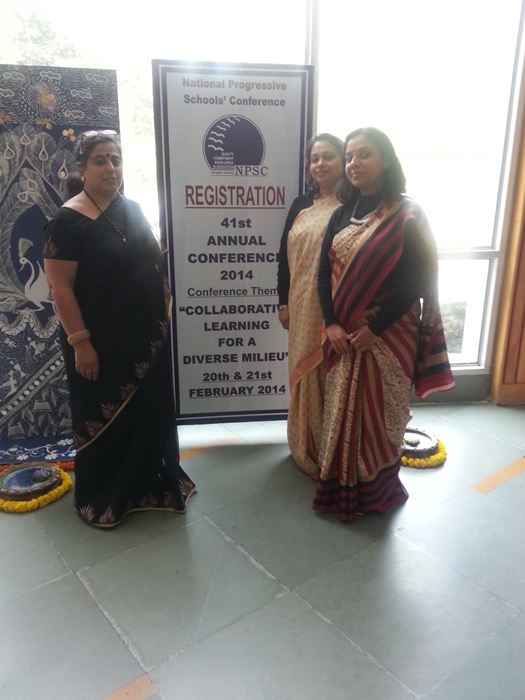41st Annual Conference, National Progressive School's Conference
Collaborative Learning for a Diverse Milieu, 20 and 21 February, 2014
A two day conference held at India International Centre was attended by Principal, Mrs. Tania Joshi accompanied by our teachers, Ms. Sukhmeen Cheema and Mrs. Sonia Mojumdar.
Day 1-
The conference began with a welcome address by chairperson, Mrs. Amita Mulla Wattal who introduced the guests and welcomed the delegates. Mrs. Wattal highlighted how we are in a very exciting and challenging space and therefore, can no longer prepare our students based upon a structure of the past.
Keynote speaker Mr. Pavan Verma, Cultural Advisor to the Chief Minister of Bihar, in an inspiring address recalled the cultural heritage of India. He appealed that we should make our children realise that they are The Change. It is our social responsibility to ensure that they are motivated to grow up as authentic Indians and not derivative citizens or linguistic half-castes!
Chief Guest, Prof. R. Govinda, Vice Chancellor, N.U.P.E.A elaborated on the major challenges faced in institution-building; the importance of developing a homogenous atmosphere inside the school and to recognise the increasing diversity within the classroom.
[gallery columns="2"]
The first session of the day was on Film and Media-Connecting Diversities.
Eminent film personality, Ms. Sharmila Tagore, in conversation with Dr. Nirmal Samanta, Reader, D.U. brought to the fore, how in a media-saturated world it is extremely important that the young should be made media-literate and not merely passive receivers.
Tracing the growth of Indian cinema in the last hundred years, Ms. Tagore accurately analysed how the engagement of cinema with reality is only peripheral and yet Indian cinema has constantly responded to the changing social scenario. She emphasised that films can inspire but not educate; as films are a world of construct and not life itself.
The question-answer session which followed established that Sharmila Tagores star attraction has not dwindled over the years! On a personal note she talked about her lineage, namely the Tagore family; her association with renowned film director, Satyajit Ray; her role as mother at home and her experience as chairperson of the Censor Board.
The second session focused on the topic- Creating a Gender- Sensitive Society.
Speaker, Mrs. Sayeda Saiyidain Hameed , Member, Planning Commission in her informative speech talked about the various provisions in the law to counter gender inequality. At the same time, she mentioned that the responsibility to remove gender bias lies equally with civil society and therefore the need to introduce the idea at the beginning, namely at school. She pointed out that gender sensitivity is to be understood not in isolation but as the front and centre of the planning of a nation.
Day Two
A great start to our second day was our session on Vision and Values in the Changing World of Learning with Mr. Gopalkrishna Gandhi (IAS Retd.) , chairman , Kalakshetra Foundation and Former Governer, West Bengal. He spoke about both, the student as well as the teacher. He emphasised that what we need to restore amongst our students today, is sense of wonderment, something that gives them a chance to say Hey! (an exclamation of surprise) ! We also need to teach them to aim for success by differentiating between success and victory as success refers to winning and victory refers to defeating the other.
Mr. Gandhis description of a teacher's journey held the audience attention tightly; he entreated that a teacher is human but is expected to be more than a human. One who has to encourage but not favour, support but not create dependence. Indeed a life that is difficult. More a a calling and not just a job, he insisted.
This interaction was followed by a Panel Discussion on Harmony in a Conflicting World . The moderator of this discussion was Ms. Sonia Singh, Editorial Director, NDTV.
1. Ms Shovana Narayan, Padmashri and kathak exponent:
We need to learn to appreciate differences,
And each of of us have to find a solution to bring harmony.
Importance has to be given to family.
2. Dr Jitendra Nagpal, Sr. Consultant of Psychiatry
Psycho-social well- being in schools is the priority
Families need to be considered a harmonious partner in education.
3. Col. Rajyavardhan Singh Rathore, Rajiv Gandhi Khel Ratna awardee & Arjuna awardee
Insecurity creates disharmony.
Our thought creates barriers.
Importance need to be given to sports, both for children and adults, it's for excellence, entertainment and harmony.
4. Mr. Rakshit Tandon, Advior, Cyber Crime
Children are leading a dual life- one is real, the other is virtual
They need to be aware of cyber- hygiene and netiquettes.
5. Ms. Naveena Jafa , cultural activist and academician
The 21stcentury is an age of dialogue
Assemblies need to consist of nourishing news
Multi-disciplinary learning using heritage education, for example
This was followed by some songs of Peace and Harmony sung by an eminent singer Ms. Radhika Chopra.
The last session was called, Stuffed Parrot, a dramatised exploration by Mr. Pranab Mukherjee, specialist Theatre of Conflict, which depicted how a parrot playing the role of a student is stuffed with various kinds of knowledge, innovations in education at different age groups etc. He eventually dies. He left the drama open- ended, leaving us seeking to introspect and conclude individually.
Finally a vote of thanks was offered to chief guest, Dr. Farooque Abdullah, Union Minister for New and Renewable Energy, chief guest and Mr. Vineet Joshi , Chairman, CBSE Guest of Honour.
Reported by Ms. Sukhmeeen Cheema and Ms. Sonia Mojumdar.













